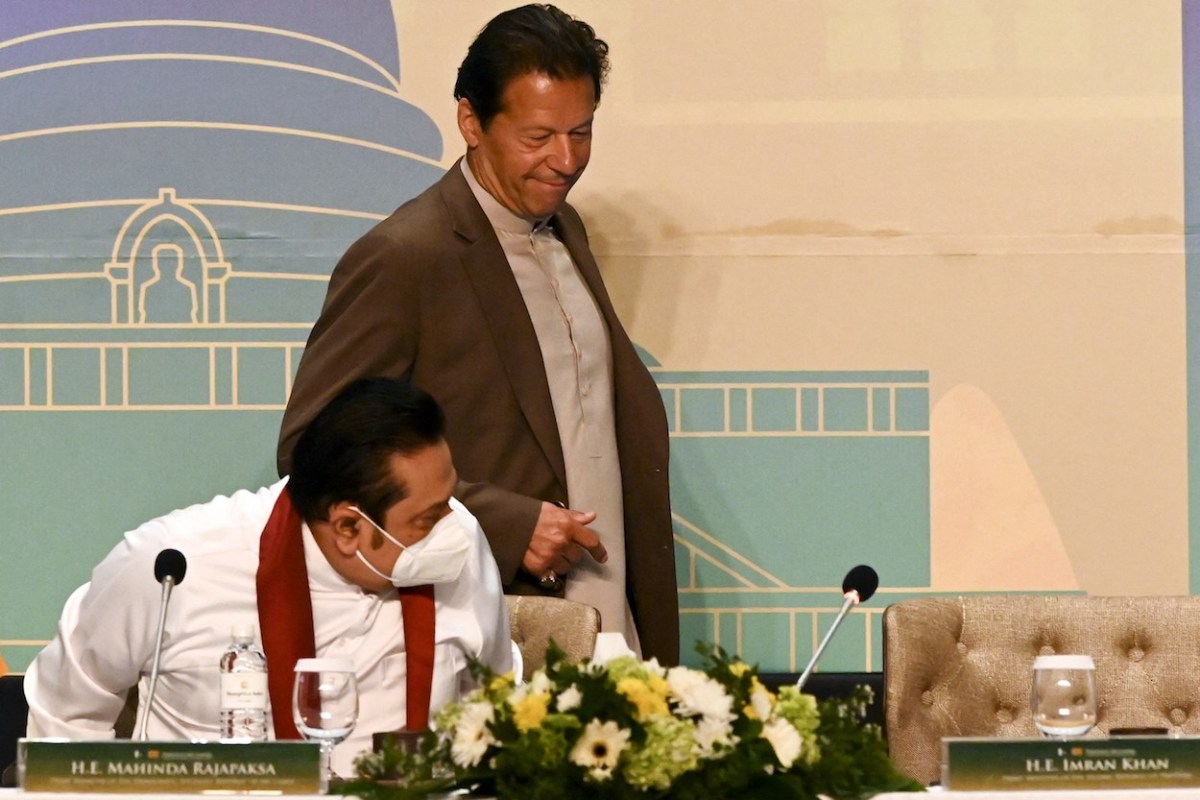[ad_1]
On February 23, Pakistani Prime Minister Imran Khan embarked on a two-day visit to Sri Lanka to reinvigorate ties. He held comprehensive talks with Prime Minister Mahinda Rajapaksa and President Gotabaya Rajapaksa.
He also addressed a bilateral investment conference and spearheaded several other critical engagements. The visit encompassed three major realms: defense, economy, and culture.
However, it must be noted that Khan’s visit to the country strategically located in the Indian Ocean appears to have had a strong geopolitical aspect, as it came against the backdrop of the brewing power competition between India and China.
The defense-level engagement can be considered the most crucial feature of Khan’s visit. Applying a strategy similar to India’s, Pakistan extended a line of credit worth US$50 million for Sri Lanka’s arms purchases.
Moreover, a crucial agreement was made to enhance intelligence sharing and cooperation on several important security issues, which include anti-terrorism and anti-crime operations.
A joint statement noted that the two sides “expressed satisfaction at the existing bilateral cooperation in the field of defense and noted that the elevation of staff-level talks to defense dialogue has further provided an opportunity to expand security-sector relations.â€Â
On the economic level, a Pakistan-Sri Lanka Trade and Investment Conference was held in Colombo on Wednesday to link the business and commercial activities between the two countries to bolster trade at a time when the Covid-19 pandemic has crippled economies all around the world.
Accordingly, the joint statement said, “The two sides stressed the importance of realizing the goal of achieving [a] $1 billion bilateral trade target and also agreed to work towards broadening and deepening of [the] Pakistan Sri Lanka Free Trade Agreement.â€Â
In another major development, Pakistani Foreign Minister Shah Mehmood Qureshi and his Sri Lankan counterpart Dinesh Gunawardena discussed the possibilities of linking the strategic Sri Lankan ports to Pakistan’s Gwadar Port, a project of the China-Pakistan Economic Corridor (CPEC) that holds an important place in China’s grand Belt and Road Initiative (BRI).
A Pakistani statement said, “Foreign Minister Qureshi … highlighted the mutual benefit that linking of Gwadar Port in Pakistan to the Sri Lankan Ports could bring to both the countries. He invited Sri Lanka to benefit from Gwadar Port for easy access to the Central Asian markets.â€
Imran Khan emphasized, “Successful trading relations will help alleviate poverty. Pakistan is part of the One Belt and Road Initiative of China, and CPEC is one of its flagship programs, and it means connectivity, and it will help enhance Sri Lanka’s connectivity right up to Central Asia.â€
In line with this, Khan also underscored the “exceptional quality†of the Pakistan-Sri Lanka bilateral partnership, which is “marked by trust, understanding and mutual support,†before inviting Mahinda Rajapaksa to visit Pakistan at the “earliest convenience.â€
The Pakistani leader also stressed the importance of building a “robust economic partnership characterized by enhanced bilateral trade, investments, and commercial cooperation.
In a statement to Arab News, Bandula Dissananayake, secretary general of the Sri Lanka National Chamber of Commerce, said, “The first-ever investment forum with 39 Pakistani business magnates will pave the way for development in trade and investments.â€
Finally, in the cultural realm, Imran Khan illustrated how Pakistan should serve as a major destination for religious tourism by Buddhist-majority Sri Lankans. In his talks with President Gotabaya Rajapaksa, Khan highlighted Pakistan’s Buddhist heritage and stressed the building of cultural ties based on this shared cultural connection.
Khan said, “Pakistan probably has one of the greatest Buddhist heritages in the world and we invite people from Sri Lanka to visit them.†He said the northern region of Pakistan is the center of an ancient Buddhist civilization and that a sleeping Buddha statue was recently discovered there. Accordingly, he added, “We are planning a Buddhist trail … with all the Buddhist great shrines and Buddhist places.â€Â
Pakistan’s multidimensional approach toward Sri Lanka implies two important things. First, it wishes to break out of its isolation in South Asia and leverage on its neighborhood relations based on the Indian model of regional relations. This will allow it to have a bigger voice in regional affairs and serve as a more formidable player in the Indian Ocean.
Second, Sri Lanka is right in the center of the power competition between India and China. As it is trying hold its own by reassuring both parties, many believe that the government tends to lean more toward China because of economic dependence. Pakistan thus wishes to take advantage of this and create a triangular partnership with China and Sri Lanka to counter India’s regional interests and influence.Â
[ad_2]
Source link













